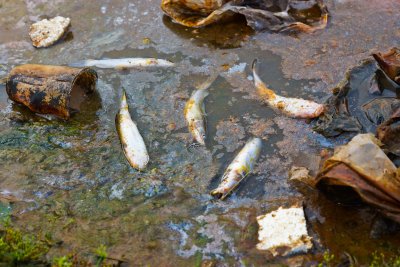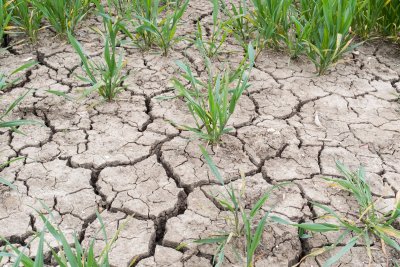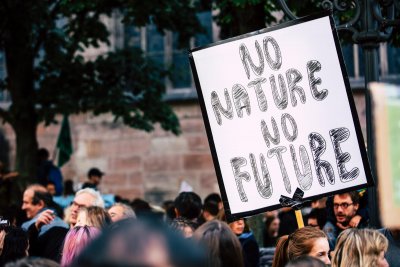Changing how food is produced and what we eat is critical to limiting the warming of the planet to within 1.5°C. We all have a part to play in creating a food system which is better for people and the planet, and here we explore how councils can significantly cut their environmental impact through food.
Declaring a climate and nature emergency
The first important step for councils is to acknowledge and declare a climate and nature emergency.
Councils that have done so are listed on the Declare a Climate Emergency website.
These declarations demonstrate a united and concerted commitment from local authorities to address the causes of the climate and nature emergency and by summer 2020, about two third of UK councils had done so. The declarations themselves range from straightforward announcements delivered during cabinet meetings, to more specific statements with agreed targets and timelines.
After making a declaration, most councils are developing and releasing action plans and policies to reduce the climate and nature impact of the council’s operations and that of citizens in their area.
Where can I find my Local Council’s Climate Change Action Plan or Declaration?
You can look on this website or try searching on the website of your local council. If you can’t find a declaration or action plan, you can write to your local councillor to ask. A list of all councils and councillors is here, or mysociety.org have a simple tool which allows you to email your councillor in just 3 clicks.
What can Councils do locally on food?
Sustain has produced a quick guide with a checklist of food-related actions that Councils can integrate into their action plans
Sustain’s Every Mouthful Counts report is another excellent resource, outlining how cities can help change our food system to help avert climate change and restore nature.
Broadly, there are three areas in which councils have the power to act:
Procurement and the diets of citizens
Local Authorities manage the food served in places including schools, council buildings, events, care facilities, libraries and leisure centres. Switching to more sustainable, healthier options, with less but better meat, more organic produce, sustainable fish, less heavily processed food, and more produce bought from smaller and local suppliers can have an enormous impact on local food supply chains and the environmental impact of an area.
Local authorities have a wider influence on the food eaten by citizens. They can offer incentives to better food businesses and restrict others (Medway Council, for example, uses planning powers to restrict junk food outlets near schools).
Councils can run public awareness-raising campaigns, and manage some advertising. Oldham Council, for example, is considering banning junk food advertising, and Southwark have done so already for council-controlled advertising spaces.
Council land and estates
Local authorities own about 4% of the land in England - including housing, industrial land, grassland, farmland and county parks. Increasing the amount of food grown sustainably on that land can dramatically cut the area’s food emissions footprint whilst creating jobs, improving access to nature and increasing biodiversity, flood protection and tree cover.
Growing food close to people, in allotments, urban parks and community growing spaces could produce a surprising amount of food, and as a minimum should be protected as valuable community assets.
Check out Sustain’s report about the potential for food growing in our urban fringes.
Food use, recycling, and waste
Councils normally have responsibility for managing waste. They can therefore ensure food wasted is absolutely minimal, by providing spaces and resources for redistributing usable food, and making sure other food waste is separated, collected and composted.
Other actions
Councils are incredible innovators, and there are many other ways that they can use their powers and influence to deliver a lower-emission food system, for example:
- Joining the 50 Fountains Challenge
- Restricting the use of very polluting food delivery vehicles
- Requiring recipients of council grants to have a sustainable food policy
Why is sustainable food so important?
Agriculture is responsible for about 20 per cent of greenhouse gas emissions globally. If we also consider habitat loss, and the threats of antibiotic resistance and future zoonotic diseases, our food system is probably the single biggest risk to the health of our planet.
The good news is that there are many quick (and inexpensive) actions that councils can take to create a more climate-friendly food system, and also make people healthier and happier.
A more sustainable food system in your locale helps to improve people’s lives in so many ways - and most should be direct priorities for the Council already - including:
- Dietary health - bluntly, eating more fresh food and fruit and vegetables and less factory farmed, processed meat would do wonders to improve our health.
- The local economy - Smaller food businesses like bakeries create more and better ‘jobs per loaf’ than industrial manufacturers. Food markets create more jobs than large retailers. Investing in good food businesses like Better Food Traders through public procurement and beneficial licensing conditions and business rates can help deliver a diverse local economy, a more resilient and less wasteful food system, and could be key to reviving high streets.
- New, good jobs - Can the council make land available for sustainable food growing? Small scale agriculture appears not to have experienced the same recent urgent staff shortages as larger farms as they provide decent and year-round jobs compatible with family life. Increasing local small scale horticulture and orchards could be a win for the planet and people. If they are close to urban populations, they could also provide the kinds of outdoor part-time jobs that many city dwellers crave, and access to land for communities that may not have considered a career in farming.
- Mental Health benefits - check out the Growing Health project to see how community food growing can be routinely used to improve health and wellbeing
Coronavirus and Climate Change
The Covid-19 pandemic has exposed a number of problems in our society and our food system, but also what can be achieved and changed when a crisis demands it.
Waste from an un-resilient system
Covid-19 led to an extraordinary amount of wasted food and milk was poured down the drain whilst at the same time millions went hungry, because supply chains did not adapt to the sudden change in buying habits. A report by the Dynamic Food Procurement National Advisory Board labelled the UK food system un-resilient and prone to such waste, because it is dominated by very few distributors, over specialisation, and too much power in the hands of a few retailers.
A June 2020 POSTNOTE from the UK Government makes the case for making changes now to create a more resilient food system in the future. Such changes would help prevent climate change, but also prevent food crises if and when we experience shocks in future. It recommends:
- Increasing the number and diversity of food businesses to prevent large-scale disruption
- Rebalance international trade with local food production
- Make our own food in harmony with the environment to reduce the chance and impact of shocks
- Require supply chains to be more transparent, to allow for better risk analysis
- Build a food system with good jobs and tackle inequality, to minimise the impact of future disruption
Sustain’s work with smaller food enterprises during Covid-19 backs up these recommendations. As our report shows, with the right support they were able to adapt to lockdown quickly with minimal waste, retaining local jobs and trading connections with farmers, and providing vital services to their communities.
The coronavirus pandemic has demonstrated, without question, that we need an approach to food which tackles inequality, injustice and the climate emergency if we are to prevent the worst future disruption and be able to cope with shocks from weather, international trade disruption, labour shortages or environmental change.
Credit: Pexels
Climate Change and Nature: Sustain has taken a keen interest in the rapidly accumulating evidence about the effect of food and farming on climate change and nature, as scientific evidence emerges that our food system is a very significant contributor to greenhouse gas emissions and biodiversity loss.



